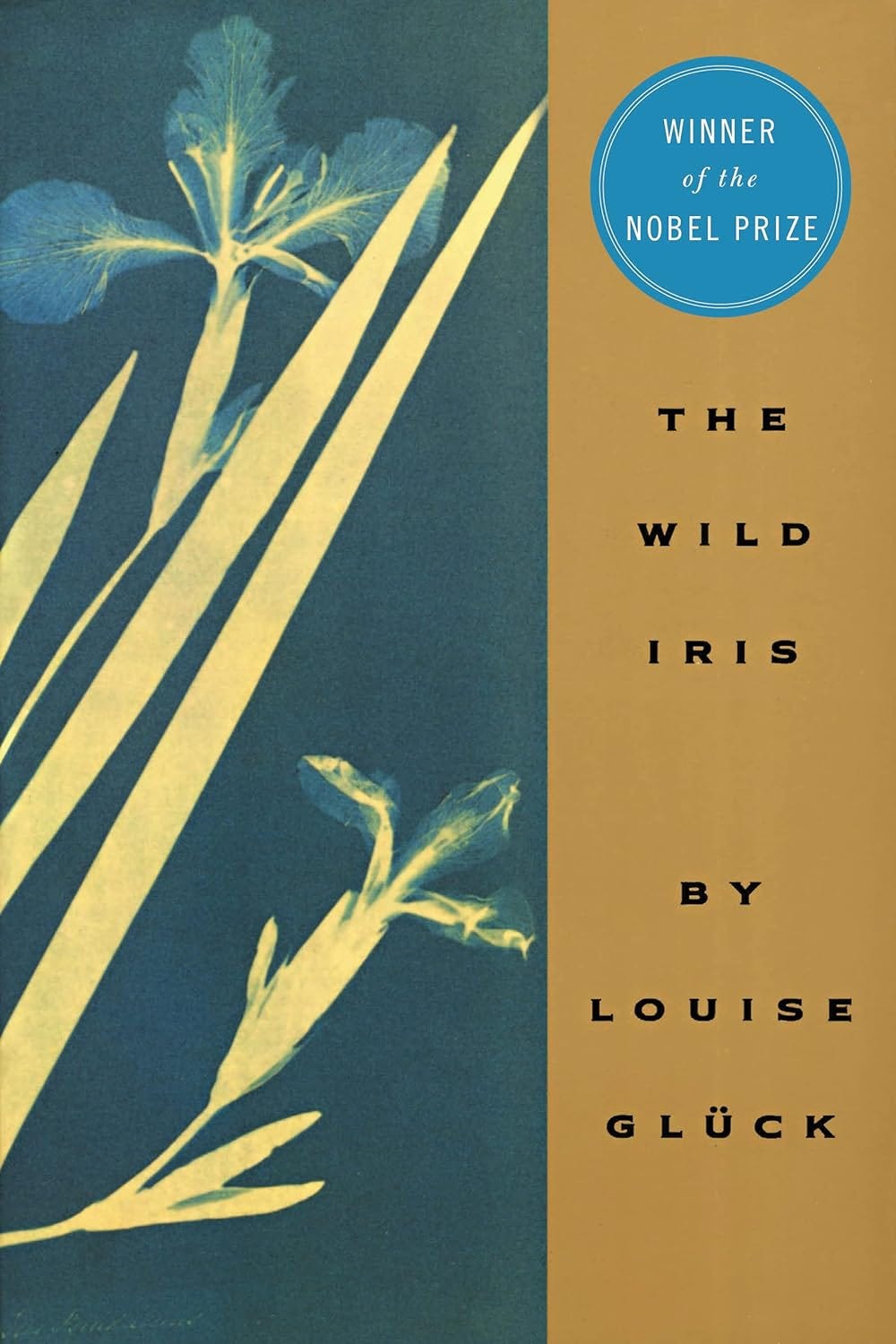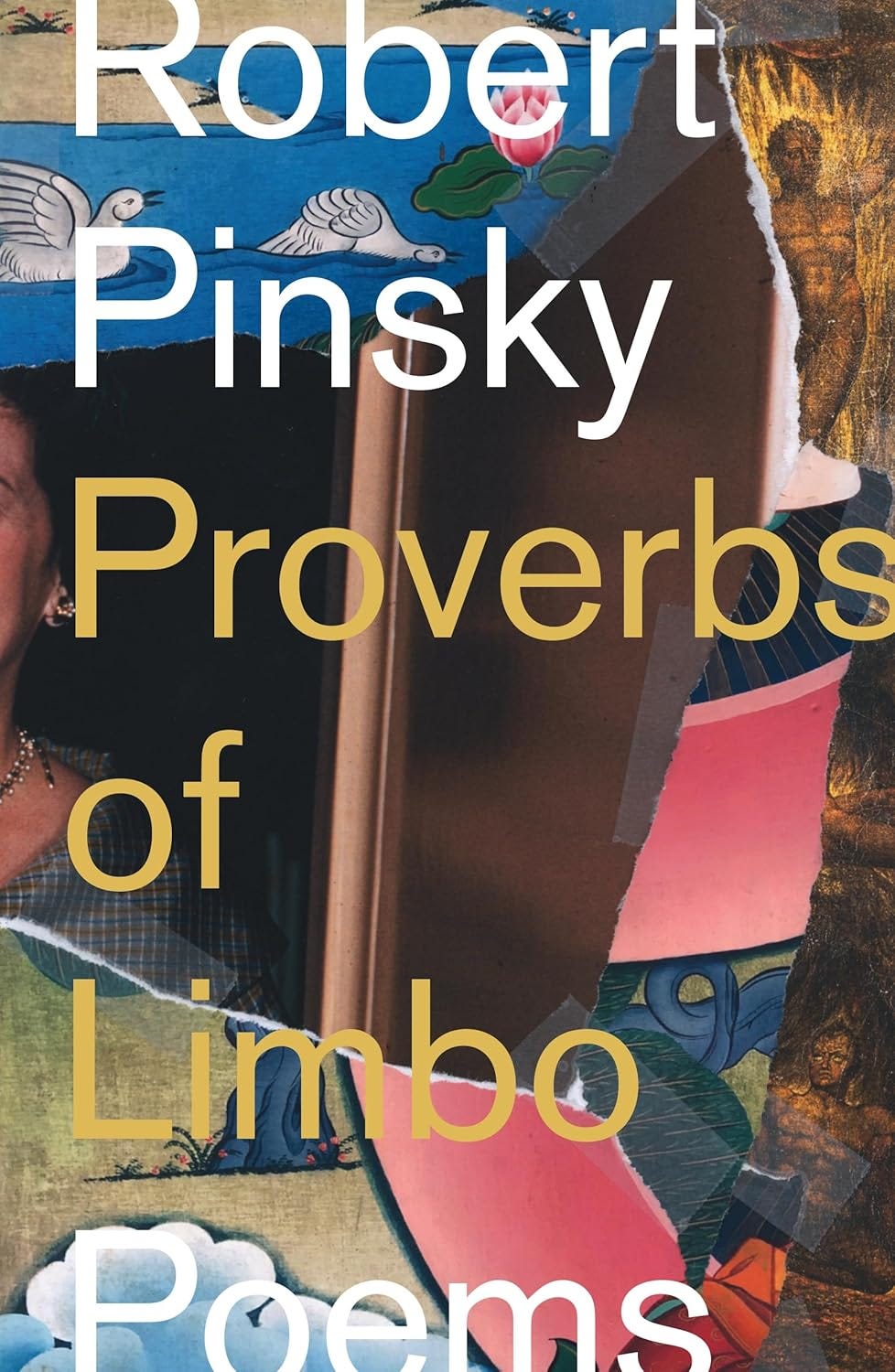Ode to the...
With side trips to the Boston Book Festival, Martin Poetry Path, and Dartmouth College
The Boston Globe, in its Sunday Ideas section, runs a periodic feature called “May I Have a Word,” where readers submit brand new made-up words to name a concept that exists in the world without a name. For example, on October 13th, 2024, the concept was “to acquire books and let them pile up without reading them,” and the winning entry from readers was “Bibliopile.”
Last month, at the Boston Book Festival, for the first time in my life, I paid full price for a slim, hard-cover book of poetry, Robert Pinsky’s Proverbs Of Limbo. The book has 67 pages, and cost me $26.00.
Pinsky spoke at the festival for an audience of a few dozen poetry devotees. A week previously, Pinsky had turned 84. He retains the vigor of a much younger person, a trait I admire more and more as I progress through my 70’s, looking for role models.
I own two books by Louise Gluck, her collected Poems 1962-2012 ($22.00), and her Pulitzer Prize winning volume The Wild Iris ($16.99). All the poems from The Wild Iris are included in the collected poems, as well as hundreds more. From a value standpoint, the collected poems is the obvious choice, but I’m far more attracted to the slim Wild Iris. Why is that so?
Pinsky read at the Book Festival the poem “Geronimo” from Proverbs Of Limbo. In 18 couplets, Pinsky interweaves various thematic threads: motion pictures, errors of language, racist atrocities, Yogi Berra, and the historic figure of Geronimo. I love the many poems of Pinsky’s like “Geronimo,” where he deftly juggles various narrative and thematic balls, transitioning from one to another seemingly randomly. Could I do the same thing with this Substack post, I wonder?
After the Pinsky reading, I scooted around the block to try to get a seat at the fairly sizable Church of the Covenant to hear Louise Erdrich read from and discuss her latest novel, The Mighty Red. No such luck; the sanctuary was already full, and hundreds of hopeful fans, including me, were turned away.
Louise Erdrich is my age, almost exactly. She was in my class at Dartmouth, the Class of ‘76. The Dartmouth class of 1976 was the College’s first class with women. Alas, many of the Dartmouth students of the time wanted to maintain a totally male-student body. I’m guessing there were plenty of times that Louise Erdrich felt unwanted. Erdrich was likely in at least one class with me, given the number of offerings from the English Department that I took, but I can’t say that I’ve ever been in her presence and aware of it at the same time. And alas, it didn’t happen at the Boston Book Festival either.
A couple of years ago, I invited the friends of the Martin Poetry Path in Newton to join me mid-path and read from The Wild Iris. Two others joined me; perhaps if instead we had read and discussed one of Louise Erdrich’s novels, there would have been more interest? We were but three, but especially in the out-of-doors, Gluck’s poetry was particularly moving. And, there was something aesthetically pleasing about reading these poems not on our smartphones, not on photocopies, not from her collected works, but from this slim volume:
Joshua Bennett teaches at Dartmouth. Back in the latter years of the 20th century, Black professor William Cole was at the center of controversy, with his classes denigrated as academically deficient by students of the school’s conservative newspaper. Joshua Bennett’s most recent book Spoken Word: A Cultural History celebrates the world of spoken poetry, the slam/jams that interweave with the history of hip-hop. It does my heart good that Bennett is at Dartmouth, a place he would have found far less welcoming 35 years ago, I suspect.
Robert Pinsky’s “Geronimo” has much to say about the portrayal of Native Americans on film and TV. Did you know that Chuck Conners played Geronimo on film? Did Jay Silverheels, Tonto on “The Lone Ranger” really get fired when they learned what “Kemosabe” meant? It should be required reading for those of us who enjoyed “The Lone Ranger” to read the collected works of perhaps America’s preeminent Native American author, Louise Erdrich.
I’ve not read a lot of Louise Erdrich, but I can’t help but take note of how prolific she remains at 70. We both have a way to go to match Robert Pinsky’s age, which is of great comfort to me.
I would suggest that there needs to be a word for the stand-alone volume of poetry, crafted by its author as an aesthetic unit.
At another thinly attended get-together on the Martin Poetry Path, I shared a handful of poems from Joshua' Bennett’s Owed. How could I have missed that his title can be read two different ways, a fact that one of our hardy outdoor group called to my attention? I’d taken Owed out of the library after reading Spoken Word, and returned it after our session, but was delighted to re encounter it at the Harvard Book Stores annual remaindered book sale. It now has a place of pride on my bookshelf.
Here’s a quote from the introduction to The Classic Hundred Poems: All-Time Favorites:
A lyric poem is the supremely present artwork: you can have it with you in its authentic form with very little trouble or expense. A painting or sonata may be, in the abstract, as great and as precious as a poem, but you have to go to some trouble to visit a museum or recital hall, or else settle for a reproduction or a recording…With poetry, however, any decent printed version just is the real thing, the thing itself, or as close to it as one can come. A penniless reader…may possess a lyric poem as fully and as authentically as anybody can. And that fact makes a poem the greatest bargain in the world; a poem is the cheapest and quickest means of making your life better in ways that deserve to be called noble.
Joshua Bennett channels the two main currents of poetry from time immemorial: the world of oral presentation and the production of a written, self-contained collection. The former is evanescent, the latter permanent, collectible, cherishable.
The Classic Hundred Poems is a lovely book, and I adore the idea that the printed poem is the real thing. But The Classic Hundred Poems is not a book of poetry in the same way that The Wild Iris is a book of poetry. Louise Gluck composed these poems, presented in book form in this order, with this cover art, laid out on the page in this way. The physical object I hold when I hold The Wild Iris is a work of art different than a collected poems, different than a Louise Erdrich novel, which comes across differently in hard cover than in paperback, differently in paperback than as an audiobook.
“Kemosabe” may be derived from the Spanish quien no sabe, or he who doesn’t understand, or in colloquial English, “ignoramus.” Thus Tonto, as he speaks to the Lone Ranger, is undermining their whole relationship. Jay Silverheels would send up his character on TV talk shows, where he likely joked about his being fired, something that I see no evidence of (the firing, that is, not the jokes). Jay Silverheels published his own poetry, by the way.
When he was a young man, Robert Pinsky wanted to be a jazz musician. Perhaps he could have found and held a job at Dartmouth easier than William Cole back then? Pinsky has his book of poems out in the world, but also has recorded them with jazz instrumental backing. Poetry on the page, poetry in the air…
The 100 Best Loved Poems, as much as I’m happy to have it in my library, is not a book like Owed, like The Wild Iris, like Proverbs of Limbo. I read a poem or two each day from the Pinsky, and know that once I’ve gotten to page 67, I’ll return to the beginning and re-encounter them all again. Most of the other more ample books in my collection I’ll never re-read, but poetry exists to be repeatedly dipped into.
What name can we devise for the object I have in my hands right now, the finite set of poems that its author devised as a unit and that I consider to be a worthy art object, all at the low, low price of a mere twenty-six bucks?




